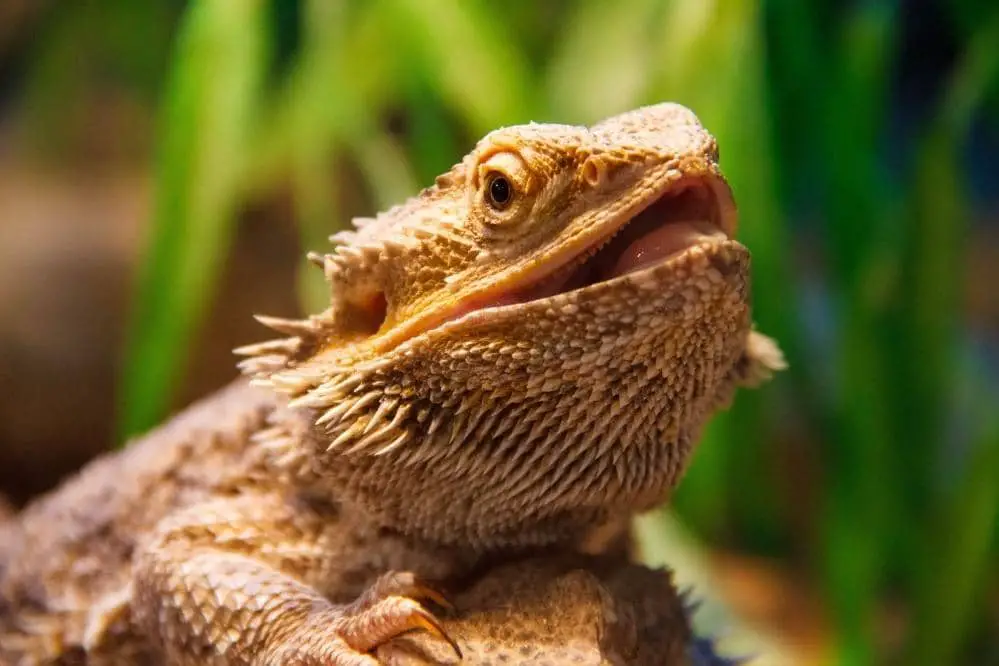At first sight, the bearded dragons look hardy and resistant to diseases. However, like all other pets, they can get ill or develop some medical issues if you are not managing them well. As a novice fancier of bearded dragons, the first issue that can make you fretful and panic is when you see the eyes of your bearded dragon are sunken.
If your beardie has sunken eyes, it clearly indicates that your pet is sick and all is not well with him. First-time beardie owners can get upset and anxious because they don’t have any idea what is happening. This could be due to multiple reasons, some of which can be deleterious or lethal. So the best way to proceed is to visit the vet clinic immediately when you notice your bearded dragon eyes are sunken.
However, it’s imperative for beardie owners to have a basic understanding of the underlying causes of sunken eyes in bearded dragons. So that they can help (or provide first aid) to their pets for the time being until the vet arrives. So based on my personal experience and thorough research, I have compiled a comprehensive guide that will help you understand why your bearded dragon has sunken eyes and how you can handle it.
1. Dehydration
Dehydration is the most common cause making the eyes sunken in bearded dragons. However, a dehydrated beardie will also show some other signs like lethargy, wrinkled skin, excessive drooling, dry mouth, and absence (or very less) of white portion of poop. If his skin takes more than one second to regain its normal position, when you release it after pinching, it also indicates that your bearded friend is dehydrated. If not addressed quickly, extreme dehydration can lead to severe discomfort in lizards and even death.
How To Proceed
To ensure that your bearded friend is drinking plenty of water, provide them a moist diet (like vegetables having higher water content, e.g., cilantro, broccoli, Cacti, mustard greens, and arugula). Place one or two water bowls in the cabin and ensure that fresh and clean water is available all the time. Regularly wash the bowls and replace the water two times daily. You can also spray water to increase the moisture content inside the cabin. Soaking in water (or giving a bath) is also a good option that helps the body to absorb water through the skin.
2. High Temperature
When your bearded dragon has sunken eyes due to unnecessarily high temperature inside the cabin, he will also show signs like open mouth breathing, panting, salivation, reddish skin (especially in the mouth and neck region), and moving here and there (seems like looking for a shade or cooler place). This generally happens when the cabin is too close to the heater, ventilation is poor, the outside temperature is very high, or your temperature regulating system is not working correctly.
Whatever the reason, the body’s water reserves of your beardie will deplete quickly, leading to dehydration and other severe consequences.
How To Proceed
Install a digital thermometer, keep an eye on the inside temperature, and ensure it is within the optimum range. The recommended basking temperatures for adult and baby beardies are 90-95 degrees Fahrenheit and 95-110 degrees Fahrenheit, respectively. Cool area temperature should range from 75-85 degrees Fahrenheit for adults and 85-95 degrees Fahrenheit for baby bearded dragons. Regularly check your thermostat and other instruments related to thermoregulation.
3. Low Humidity
Humidity is another factor that can make the eyes of your bearded dragon sunken. Humidity is actually the number of water vapors in the environment, and low humidity means dry air that will make your beardie dehydrated soon. And your bearded dragon will show signs of dehydration along with sunken eyes.
How To Proceed
Obviously, you need to maintain the humidity within the desired range. The recommended humidity range for bearded dragons is 20-40%. Installing a good quality hygrometer will help you monitor the cabin’s humidity level. If the humidity is below the desired level, you can spray water inside the cabin to increase the moisture content of the air inside.
4. Physical Illness
Sometimes sunken eyes in bearded dragons indicate many health issues, and signs other than sunken eyes depend on the disease. Often sunken eyes signal following conditions.
- Impaction: Other signs include lethargy, sleeping more, pooping less than usual, or not pooping at all.
- Gastroenteritis: Other symptoms of inflammation of the intestine and stomach are weakness, diarrhea, nausea or vomiting, dehydration, etc.
- Kidney Disorder: In older beardies, kidney malfunction is a major cause of sunken eyes, and other signs include weight loss, anorexia, anuria, polyuria, etc.
- Respiratory Dysfunction: Other signs of respiratory infection or dysfunction are difficult or open mouth breathing, sneezing, coughing, etc.
How To Proceed
If you suspect your bearded dragon has sunken eyes due to some underlying disease, you should immediately take your beardie for medical screening. It is crucial because some diseases can progress quickly and can be life-threatening.
5. Parasites (Internal & External)
Both internal and external parasites are as prevalent in bearded dragons as in any other pet animal. Internal parasites include round worms and tapeworms that can cause the eyes of your beardie to be sunken by causing anemia (as they suck blood).
However, as far as sunken eyes are concerned external parasites are major culprits. External parasites (like fleas, mites, and ticks) frequently infest the bearded dragons. Especially mites are a big threat because they are so small that they can’t be seen with the naked eye and reside under the skin in softer areas of the body. The eyes are their favorite place because the skin on the eyes and surrounding area is soft, has sufficient moisture, and is rich in blood supply.
How To Proceed
If the presence of internal or external parasites is suspected, first, you need to take a prescription from a veterinarian. Secondly, place your bearded dragon in a temporary cabin and thoroughly clean and sanitize your beardie’s original house before putting him back.
6. Under Weight Or Malnourished
If your bearded dragon weighs less than normal, it indicates its body is not working properly. This condition affects the whole body resulting in the loss of muscles, including the eyes. Loss of eye muscles makes the eye sunken. This can happen because you are not offering a well-balanced and healthy diet, or your beardie is not eating well due to some underlying condition.
How To Proceed
The best option is to get an appointment with a vet for a medical checkup. If your vet finds any chronic problem, he will prescribe medicines accordingly. If everything is ok, then your bearded dragon is simply malnourished, so provide him with a healthy diet, especially offer a fatty diet (like hornworms, wax worms, super worms, etc.) more often.
7. Stress & Lack Of Sleep
Generally, an adult bearded dragon sleeps 8-10 hours, while baby beardies sleep 2-3 hours more than adults. If your bearded friend is not getting enough sleep due to stress or any other reason, this can cause his eyes to sunken.
How To Proceed
Make the internal environment of the cabin comfortable and stress free by maintaining optimum temperature and humidity and natural habitat and removing all the potential stress factors. Turn off the lights and don’t make noise when your bearded dragon is sleeping so that his sleep is not interrupted.

